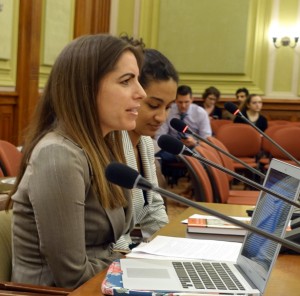Yesterday the DC council held an historic hearing on street harassment. This was my testimony.
 Good morning, members of the Committee on the Judiciary and the Committee on Housing & Community Development. My name is Holly Kearl. I am the founder of Stop Street Harassment, a consultant for UN Women’s Safe Cities Global Initiative and the author of several books about sexual harassment in public spaces, or street harassment.
Good morning, members of the Committee on the Judiciary and the Committee on Housing & Community Development. My name is Holly Kearl. I am the founder of Stop Street Harassment, a consultant for UN Women’s Safe Cities Global Initiative and the author of several books about sexual harassment in public spaces, or street harassment.
I’ve lived in the area for more than 10 years and across 8 of them, I was in DC daily for graduate school and then work. Like probably everyone in the room, I’ve personally experienced numerous instances of harassment here.
I am thrilled this roundtable is taking place. Only three other city councils in the country have held sessions specifically on this topic: NYC in 2010, Philadelphia in 2013, and Kansas City in 2014.
Yet, street harassment is a pervasive problem across the nation. My organization commissioned the largest nationally representative survey to date last year and it found that 2/3rds of women and 1/4th of men had faced street harassment. Women mostly faced sexualized comments and nearly 1 in 4 reported being touched sexually in a public space.
For men, homophobic or transphobic slurs were most common. As part of the research, I also conducted focus groups nationwide, including one with gay and bisexual men in Washington, DC, many of whom shared numerous harassment stories.
For most people who took the survey, street harassment began before age 17. This is not okay.
Addressing street harassment matters because it makes people feel unsafe, objectified, and uncomfortable in public spaces. It can limit people’s lives in significant ways, including where they go, when, with whom and what they do.
For this reason, a growing number of governments as well as the United Nations view street harassment as a human rights violation and something that prevents full equality.
I am grateful that Washington, DC leaders are acknowledging this too, most notably, on the transit system. Nearly four years ago, I testified about harassment before the city council during WMATA’s performance oversight hearing. I am glad that WMATA quickly agreed to begin tracking incidents, train their staff, and create PSAs. I can’t help but smile each time I see a poster on the system.
We join other capital cities who have recently launched transit campaigns in London, Paris, Tokyo, Delhi, Cairo and Bogota and in American cities like Los Angeles, Boston, Philadelphia, and NYC.
WMATA has committed to another PSA campaign next year, for which I’m grateful. We’ve discussed having its message focus on encouraging bystanders to speak up. For a first recommendation today, I want to emphasize the importance of bystanders being the focus.
Bystander intervention is important for many reasons and one is that it can help a harassed person get through a terrible situation more easily. I have heard over and over from women who say that an experience was so much worse because there were people all around when the harassment happened but no one said or did anything. If they are taught what to do, bystanders may be able to interrupt or stop the harassment, or at the very least, check in with the harassed person to see if they are okay and thus help them recover more quickly from what happened.
Harassment of course, is not limited to the transit system. It also happens on the streets, in parks, in bars and clubs, and in stores and restaurants. For that reason, my second recommendation is that the city council work with local groups like CASS and SSH on collecting data so we can better understand the problem and work to end it, using community-based, non-criminal solutions.
And last, because many people feel alcohol or the relaxed atmosphere of a bar or club makes inappropriate behavior okay, I would also suggest a special focus on addressing harassment there. A few cities have campaigns to train bar and club staff about harassment, including Boston and Iowa City and the whole state of Arizona. In the UK, the Good Night Out campaign works nationally with more than 100 night life venues.
Locally, CASS and Defend Yourself have a Safe Bars program and I hope the city council can help give local establishments incentives to work with them.
I am proud to live in an area where street harassment is taken seriously and I look forward to collaborating and working with the city council in the future. Thank you.
